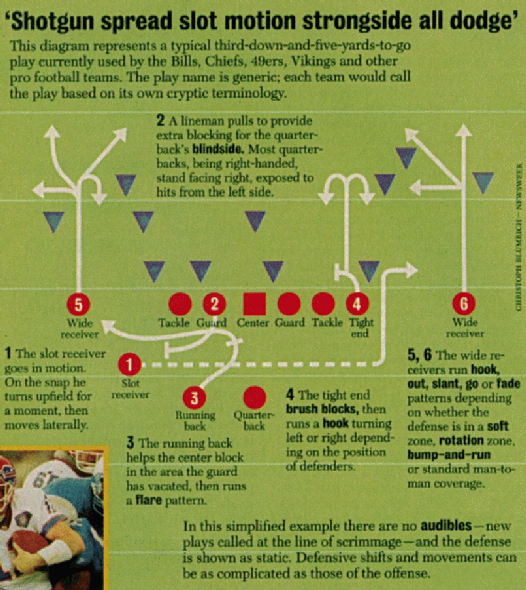Article:
Why don't eggheads love football?
Newsweek
December 5, 1994
Page 64
By Gregg Easterbrook
What would have been the World Series has receded into nothingness, accompanied by
melancholy laments. Now through January, football takes center stage as the national
pastime -- and that's bad news for the highbrow set. For decades American writers and
intellectuals of all stripes have been producing paeans to baseball, while nearly ignoring
football. Is it that highbrows object to the violence in football? Perhaps, yet writers
from Hemingway to Joyce Carol Oates have written admiringly of bullfighting and boxing,
which are far more violent. Here's the real reason the smart set shuns football: it's too
complicated. Intellectuals just don't understand it.
Baseball has a cordial grace any thoughtful person ought to find appealing. The sport also
offers something else: its action is easy to understand, especially for highbrow types
unlikely themselves to have played sports at a competitive level. "There exists a
common misconception that baseball is full of byzantine strategies that only the most
sophisticated observer can grasp," says Jeff Klein, sports editor of The Village
Voice. "That just isn't true. Baseball tactics are simplistic compared to
football."
During most of a baseball game only two or three players are in motion. Much of what they
do is dictated by tactics that vary little among teams, and almost not at all from game to
game. Football is quite different. Throughout the action, every one of 22 players in in
rapid motion. Individual teams have dramatically different approaches to offense and
defense, and change tactics from game to game. Why do quarterbacks wear those wristbands
imprinted with play-calling terminology. Because the typical football team goes into a
game with dozens of plays run from multiple formations. Most sports have few choreographed
plays, let alone new ones for every game.
Baseball is sufficiently straightforward that the casual enthusiast can expound on basics
such as fielding alignments or batting order. In contrast, even most football writers
would be hard pressed to explain, say, the two-deep rotation zone defense, or diagram the
differences between the "West Coast" pass patterns used by Joe Montana's Kansas
City Chiefs and the "timing and slant" patterns employed by the Dallas Cowboys.
The complexities of football make it almost impossible to bluff an understanding of the
game. And if there's one thing intellectuals hate, it's not being able to bluff their way
to apparent mastery of
something.
Elaborate study: Owing to the complexity of football, game plans are composed in
conjunction with the elaborate study of opponents. When the New York Giants won the 1991
NFC championship game in San Francisco, the team had a jet stocked with computers standing
by so the coaching staff could use the five-hour flight to the Super Bowl site in Tampa to
get a jump on analysis of the next opponent. That sort of research sounds almost academic
-- how annoying to eggheads that rednecks do it! Better that athletes occupy their
expected class niches, chewing tobacco and telling rustic anecdotes.
Football holds so many variables that "Can he handle the playbook?" is a
question now asked by recruiters from the junior- college level on up. I played college
football at the Division Three (small school) level; my mediocre performances often were
further hurt by the fact that I had as much trouble remembering where I was supposed to be
as executing the plays. Recognizing the mental demands of the game, many pro football
teams now give educational aptitude tests to prospective draft choices. Some 35 percent of
NFL players have bachelor's degrees, probably the highest percentage in pro sports. At the
Division one (big school) college level, football players have the highest graduation rate
of participants in the major NCAA sports. In some recent years graduation rates for
Division One football players, both black and white, have exceeded the graduation rates
for all male students.
So football actually has surprisingly astute people doing complicated things in a sport
with all the dimensions of a chess game. If Ken Burns did a "Football" series
for PBS, hours of it would have to be devoted to play-chart diagrams about as
comprehensible as the route structure of the United Airlines. The hidden secret of
football, supposedly the diversion of blue- collar drudges, is that it's actually taxing
on the brain. No wonder intellectuals shun it.

|